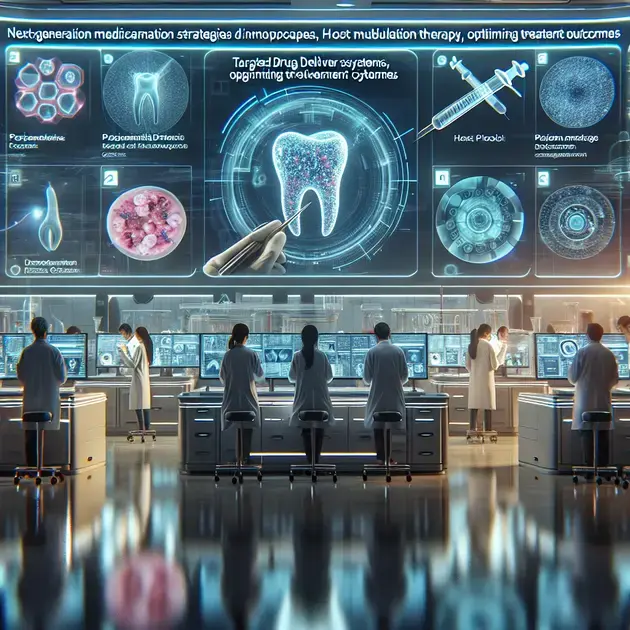When it comes to dealing with periodontitis, finding effective medication is crucial for successful treatment. In this comprehensive guide, we will explore the various options available to effectively manage and treat periodontitis, a serious gum infection that can damage the soft tissue and destroy the bone that supports your teeth.
With advancements in dental research and technology, there are now several proven medications and treatment approaches that can help combat periodontitis and improve the overall health of your gums. It’s important to understand the different medications available and how they can be used in combination with good oral hygiene practices to effectively address periodontitis.

Understanding Periodontitis Medication Options
Periodontitis is a serious gum infection that damages the soft tissue and destroys the bone supporting your teeth. When it comes to medication options for treating periodontitis, it’s essential to consult with your dentist or periodontist to determine the best course of action for your specific condition. One common medication option is antibiotics, which can be prescribed to help control the bacterial infection causing periodontitis. These antibiotics may be taken orally or applied directly to the affected area.
Another medication option is antimicrobial mouth rinses, which can help reduce the bacteria in your mouth and promote healing. These rinses are often used in conjunction with other treatments, such as scaling and root planing. It’s important to follow your dentist’s recommendations for how often to use the mouth rinse for optimal results.
In more severe cases of periodontitis, medication options may include enzyme suppressants, which can help prevent further destruction of the bone and connective tissues in your mouth. These medications work by inhibiting the enzymes that break down these tissues, allowing for better healing and regeneration.
For a comprehensive list of periodontitis medication options and their potential side effects, you can refer to reputable sources such as the American Academy of Periodontology website. They provide detailed information on the various medications available and how they can benefit your overall periodontal health.
By understanding the different medication options for periodontitis and working closely with your dental care provider, you can effectively manage and treat this condition to maintain good oral health.
Exploring the Benefits of Advanced Dental Treatments
Advanced dental treatments offer a wide range of benefits for individuals looking to improve their oral health and enhance the appearance of their smile. One popular advanced dental treatment is dental implants, which are titanium posts that are surgically placed in the jawbone to replace missing teeth. Dental implants provide a natural-looking and long-lasting solution for tooth replacement.
Another advanced dental treatment is Invisalign, a clear aligner system that effectively straightens teeth without the use of traditional metal braces. The benefits of Invisalign include improved comfort, convenience, and aesthetics during the teeth straightening process. You can explore the benefits of Invisalign further by visiting their official website and scheduling a consultation with an Invisalign provider in your area.
Cosmetic dentistry procedures such as teeth whitening, veneers, and dental bonding are also popular advanced dental treatments that can improve the appearance of your smile. These treatments can address issues such as stained, chipped, or misaligned teeth, helping you achieve a more confident and attractive smile.
By exploring the benefits of advanced dental treatments through reputable sources such as the American Dental Association website, you can gain valuable insights into the various treatment options available and how they can enhance your overall dental health and well-being.
Consulting with a qualified dentist or specialist in advanced dental treatments can help you determine the most suitable options for your specific oral health needs and goals.
Optimizing Treatment Results with a Comprehensive Approach
When it comes to optimizing treatment results for dental conditions such as periodontitis, taking a comprehensive approach to your oral health care is key. This involves not only receiving appropriate medical treatment but also maintaining good oral hygiene practices at home and making healthy lifestyle choices.
One important aspect of a comprehensive approach to treatment is following your dentist’s recommendations for post-treatment care. This may include using prescription medications as directed, attending follow-up appointments, and practicing good oral hygiene habits such as brushing and flossing regularly.
Implementing a well-rounded oral care routine that includes regular dental check-ups and cleanings can help prevent future complications and optimize the results of your treatment. Websites like Colgate provide useful tips and resources for maintaining optimal oral health and maximizing the benefits of professional dental care.
In addition to professional dental care, a comprehensive approach to treatment may also involve making healthy lifestyle choices such as eating a balanced diet, avoiding tobacco products, and managing stress. These factors can significantly impact your oral health and overall well-being, supporting the effectiveness of your treatment outcomes.
By taking a proactive and comprehensive approach to your treatment plan, in collaboration with your dental care team, you can achieve the best possible results and maintain a healthy smile for years to come.

Exploring Advanced Dental Solutions for Periodontitis
Periodontitis is a serious gum infection that damages the soft tissue and destroys the bone that supports your teeth. Exploring advanced dental solutions for periodontitis is crucial in effectively managing this condition. One innovative approach is the use of laser therapy, which can target and remove inflamed gum tissue while promoting the regeneration of healthy tissue. This minimally invasive technique can help speed up the healing process and reduce the risk of complications.
Another advanced solution for periodontitis is the use of probiotics. Probiotics are beneficial bacteria that can help restore the natural balance of bacteria in your mouth, reducing inflammation and fighting off harmful bacteria that contribute to periodontal disease. Incorporating probiotics into your oral care routine can complement traditional treatments and improve overall gum health.
In addition to traditional scaling and root planing procedures, advanced dental solutions for periodontitis may also include the use of regenerative techniques. This can involve the application of growth factors or tissue-stimulating proteins to help regenerate damaged bone and tissue, promoting a more effective healing response. By combining these innovative approaches with personalized treatment plans, dental professionals can provide comprehensive care for patients with periodontitis.
By staying informed about the latest advancements in periodontal care and considering these advanced dental solutions, patients can better manage their periodontitis and improve their oral health outcomes. Investing in preventive measures and early intervention can help minimize the progression of this chronic condition and preserve the health and function of your smile.
Maximizing Treatment Efficiency with Innovative Approaches
When it comes to maximizing treatment efficiency for periodontitis, innovative approaches can play a significant role in improving patient outcomes. One such approach is the use of digital technologies, such as 3D imaging and intraoral scanners, to create precise treatment plans and monitor progress throughout the healing process. These tools allow for more accurate diagnosis and treatment, leading to better overall results.
Another innovative approach to maximizing treatment efficiency is the incorporation of regenerative therapies, such as platelet-rich plasma (PRP) or growth factor therapy. These techniques can help accelerate the healing process, reduce inflammation, and promote tissue regeneration, ultimately enhancing the effectiveness of periodontal treatments. By harnessing the body’s natural healing abilities, dental professionals can provide targeted and efficient care for patients with periodontitis.
In addition to clinical interventions, patient education and personalized home care regimens are essential in maximizing treatment efficiency. Providing guidance on proper oral hygiene practices, dietary recommendations, and lifestyle modifications can empower patients to take an active role in their periodontal health. By promoting a collaborative approach to care, dental teams can work together with patients to achieve optimal treatment outcomes.
By embracing innovative approaches and continuously seeking new strategies for enhancing treatment efficiency, dental professionals can elevate the standard of care for patients with periodontitis. By prioritizing individualized care plans, fostering patient engagement, and integrating cutting-edge technologies, dental practices can optimize their treatment protocols and deliver superior outcomes for those affected by this chronic inflammatory condition.
Elevating Periodontitis Care through Next-Generation Medication Strategies
Next-generation medication strategies offer a promising avenue for elevating periodontitis care and addressing the underlying causes of this complex condition. One innovative approach is the use of host modulation therapy, which aims to modulate the body’s immune response to reduce inflammation and promote tissue repair. By targeting specific inflammatory pathways, medications can help control the progression of periodontitis and support long-term gum health.
Another key aspect of next-generation medication strategies for periodontitis is the development of targeted drug delivery systems. These advanced techniques allow for the precise delivery of therapeutic agents to the affected areas, maximizing their effectiveness while minimizing potential side effects. By enhancing drug bioavailability and retention, targeted delivery systems can improve treatment outcomes and optimize patient comfort during periodontal therapy.
Incorporating novel pharmacological agents, such as host-derived peptides or bioactive molecules, into periodontitis care can also revolutionize treatment approaches. These innovative medications can help combat bacterial infections, promote tissue regeneration, and enhance the body’s natural defenses against periodontal pathogens. By leveraging the latest advancements in pharmaceutical research, dental professionals can offer patients cutting-edge solutions for managing their periodontal health.
By embracing next-generation medication strategies and staying at the forefront of clinical innovation, dental practices can elevate the quality of care provided to patients with periodontitis. Through a combination of targeted drug therapies, personalized treatment plans, and ongoing monitoring, dental teams can effectively manage this chronic condition and support long-term gum health. By integrating advanced medication strategies into comprehensive periodontal care protocols, practitioners can improve patient outcomes and enhance the overall success of treatment interventions.
Conclusion
Exploring advanced dental solutions for periodontitis is essential for effectively managing this serious gum infection. Innovative approaches such as laser therapy, probiotics, and regenerative techniques offer promising ways to promote tissue regeneration, reduce inflammation, and improve overall gum health. By combining these advanced solutions with personalized treatment plans, dental professionals can provide comprehensive care to patients with periodontitis, helping them better manage the condition and enhance their oral health outcomes.
Maximizing treatment efficiency through innovative approaches like digital technologies and regenerative therapies plays a crucial role in improving patient outcomes. By utilizing precise treatment planning tools and harnessing the body’s natural healing abilities, dental teams can offer targeted and efficient care for individuals with periodontitis. Educating patients on proper oral hygiene practices and involving them in personalized home care regimens further enhances treatment efficiency, empowering patients to take an active role in their periodontal health.
Elevating periodontitis care through next-generation medication strategies offers new avenues for addressing the underlying causes of this complex condition. Techniques like host modulation therapy, targeted drug delivery systems, and novel pharmacological agents can revolutionize treatment approaches by reducing inflammation, promoting tissue repair, and combatting bacterial infections. By integrating these advanced medication strategies into comprehensive care protocols, dental practices can significantly improve patient outcomes and elevate the quality of periodontitis care.



